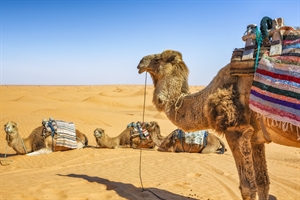One third of the world’s land is arid or semi-arid and these desert landscapes continue to intrigue and fascinate travellers. Business travellers are drawn to the oil-rich lands of the Middle East, while adventure-seekers head for the Gobi Desert in China and Mongolia. Parts of the Arctic and Antarctica also qualify as deserts, although most travellers will have to contend with heat, rather than cold! Hajj pilgrims will be visiting a desert region.
Here are some tips to protect your health in the desert.
1. Clean water
Where water is in short supply, you may turn to unsanitary sources that could expose you to water-borne diseases including cholera, cryptosporidiosis, dysentery, giardia, hepatitis A and typhoid. So you should carefully consider your water sources before you leave home.
If you bring a couple of one-litre water bottles, it will help you stay hydrated when you are out and about.
You can rely on water in factory-sealed bottles.
Purifying water may be appropriate, too, and this is a good option to have if you will be visiting remote areas. The Government of Canada has some water treatment advice for travellers.
2. Acclimatise to the heat
The extreme heat in Doha, Qatar (average high of 38°C) or Dubai (36°C) would challenge most people used to the Canadian climate. You should allow about ten days to fully acclimatize to these sorts of temperature. Do not expect to jump right into a strenuous timetable of activity. Instead, allow for a few slow relaxing days. And if you can, do not retreat into an air-conditioned room because this will slow the process down.
3. Be aware of dehydration
In a climate that is hotter and drier than your home climate dehydration may become a problem because you are sweating more than usual. It may be made worse if you get a case of travellers’ diarrhea. Drink more than you would at home – aim for urine of a light straw colour.
These are some signs of dehydration:
- dizziness and headache
- tiredness
- dry eyes, lips and mouth
- passing urine less than three times a day, and urine may be dark in colour, too.
If you experience any of these symptoms of dehydration, take more fluids. If you don’t start to feel better, see a doctor: untreated dehydration can be life-threatening.
4. Understand sun safety
Sunburn can increase your risk of skin cancer. You should cover up with long, loose clothing, a sunhat or umbrella and sun glasses. Apply plenty of sunscreen before you go out, and bring a good supply with you in case it is hard to get hold of at your destination.
Read more sun safety tips from the Government of Canada.
5. Be aware of heatstroke
When you get too hot, heat exhaustion occurs. Heat exhaustion can come on very quickly. Its symptoms include:
- dark urine
- faintness
- headache
- heavy sweating
- muscle cramps
- nausea
- raised pulse
- thirst
- tiredness
To treat heat exhaustion, lie the patient down in a cool place. You can help them cool down by removing extra clothing, wetting their skin and fanning them gently. Give some fluids to help with dehydration.
Untreated, heat exhaustion may progress to heat stroke, which can be fatal. The patient may lose consciousness, in which case, you can help by putting them in the recovery position while you call for medical help.
6. Make an appointment with travel health clinic
The specialist nurses at Canadian Travel Clinics can give you even more advice tailored to your destination. Make a free appointment today at one of our Alberta travel clinics and tell us all about your travel plans.

